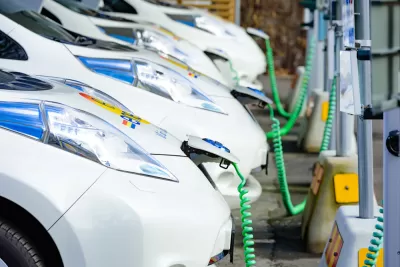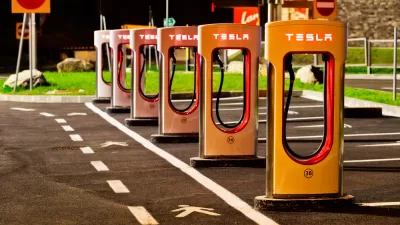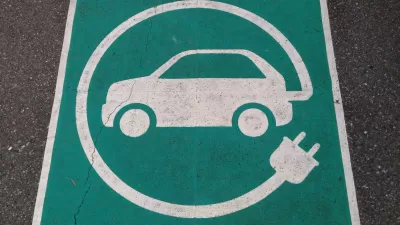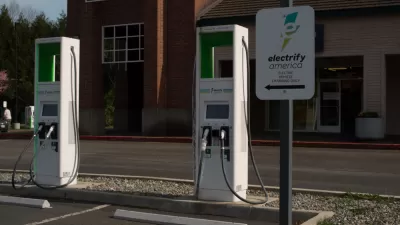The bill also calls for increased investment in charging infrastructure and financial incentives for consumers.

If signed by Governor Andrew Cuomo, a bill passed by the New York state legislature would "require all sales of new passenger cars and trucks in the state be zero emission by 2035," reports Robert Walton in Smart Cities Dive. The legislation includes the same requirement for medium and heavy-duty trucks by 2045.
Electrification advocates praise the bill as a "really great first step," but "eliminating emissions from the transportation sector will ultimately require development of a broader EV marketplace including charging infrastructure," says Kathy Harris, clean vehicles and fuels advocate at the Natural Resources Defense Council (NRDC).
New York "is also targeting carbon-free electricity by 2040 and an 85% reduction in economy-wide emissions by 2050," writes Walton. The bill includes directives to "accelerate the development of affordable fueling and charging options for zero emission vehicles, with a focus on ensuring access in low-income and economically disadvantaged communities."
The legislation comes as other states and the federal government ramp up their own investment in electric vehicle infrastructure. Last November, California became the first state to ban the sale of cars powered by internal combustion engines by 2035 through an executive order issued by Governor Gavin Newsom. At the federal level, "[t]he Biden administration has committed to building 500,000 public chargers and wants to spend $174 billion to grow the adoption of electric vehicles."
FULL STORY: New York lawmakers pass bill requiring all new vehicle sales be zero-emissions by 2035

Study: Maui’s Plan to Convert Vacation Rentals to Long-Term Housing Could Cause Nearly $1 Billion Economic Loss
The plan would reduce visitor accommodation by 25,% resulting in 1,900 jobs lost.

North Texas Transit Leaders Tout Benefits of TOD for Growing Region
At a summit focused on transit-oriented development, policymakers discussed how North Texas’ expanded light rail system can serve as a tool for economic growth.

Why Should We Subsidize Public Transportation?
Many public transit agencies face financial stress due to rising costs, declining fare revenue, and declining subsidies. Transit advocates must provide a strong business case for increasing public transit funding.

How to Make US Trains Faster
Changes to boarding platforms and a switch to electric trains could improve U.S. passenger rail service without the added cost of high-speed rail.

Columbia’s Revitalized ‘Loop’ Is a Hub for Local Entrepreneurs
A focus on small businesses is helping a commercial corridor in Columbia, Missouri thrive.

Invasive Insect Threatens Minnesota’s Ash Forests
The Emerald Ash Borer is a rapidly spreading invasive pest threatening Minnesota’s ash trees, and homeowners are encouraged to plant diverse replacement species, avoid moving ash firewood, and monitor for signs of infestation.
Urban Design for Planners 1: Software Tools
This six-course series explores essential urban design concepts using open source software and equips planners with the tools they need to participate fully in the urban design process.
Planning for Universal Design
Learn the tools for implementing Universal Design in planning regulations.
Ascent Environmental
Borough of Carlisle
Institute for Housing and Urban Development Studies (IHS)
City of Grandview
Harvard GSD Executive Education
Toledo-Lucas County Plan Commissions
Salt Lake City
NYU Wagner Graduate School of Public Service





























